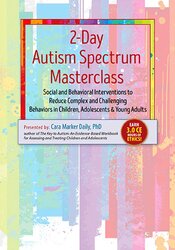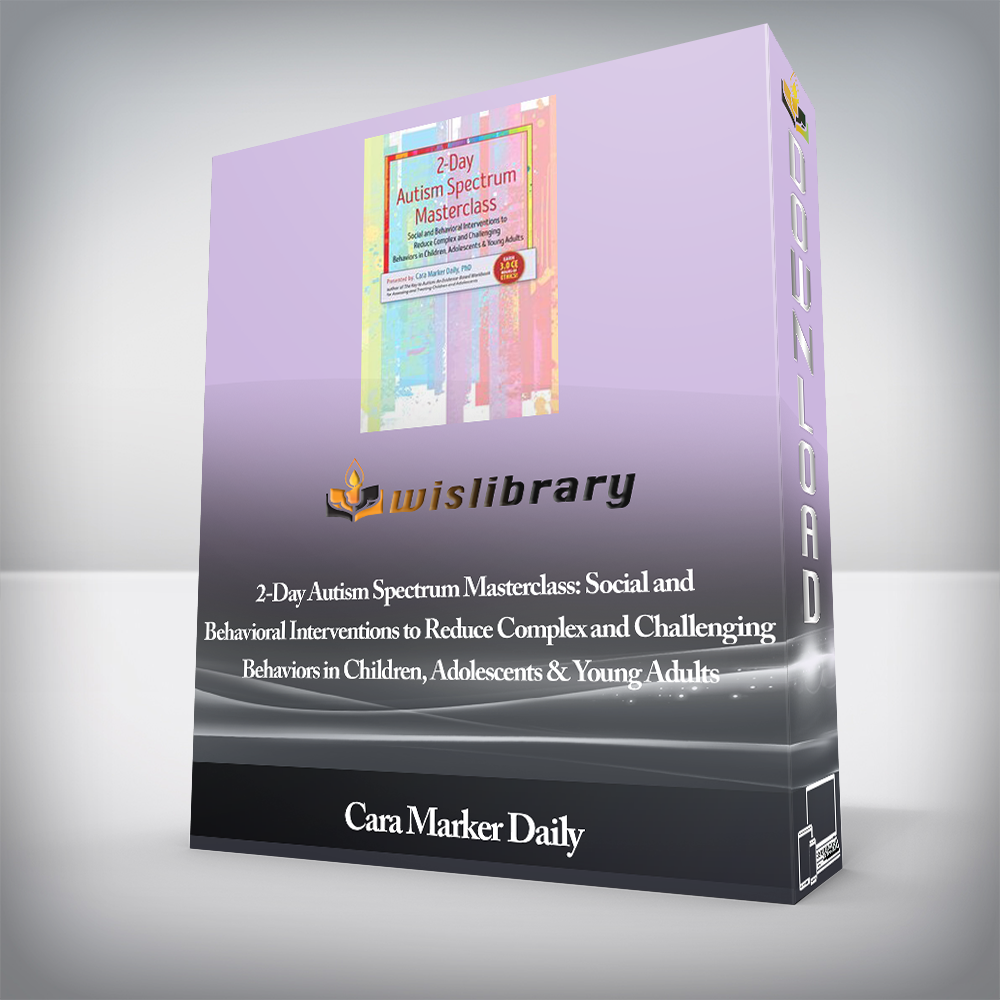Transform your autism intervention with this 2-day Autism Spectrum Masterclass recording!
File Size: 4.57 GB.
Cara Marker Daily – PESI – 2-Day Autism Spectrum Masterclass: Social and Behavioral Interventions to Reduce Complex and Challenging Behaviors in Children, Adolescents & Young Adults

Begin by joining autism expert and author, Cara Daily, PhD, BCBA, and learn the most effective evidence-based social and behavioral interventions for working with the pervasive comorbid disorders and symptoms associated with ASD.
Dr. Daily makes this complex disorder easy to understand—you will leave with the interventions and skills required to confidently teach children, adolescents and young adults with autism how to live more independent and fuller lives!
Learn how to integrate the latest research on brain development, visual and environmental modifications, cognitive-behavioral interventions and successful psychosocial techniques to help clients manage challenging behaviors related to ASD.
Through engaging case studies, demonstrations, and hands-on activities you will learn the skills necessary to:
- Manage emotional and physical reactions to anxiety and OCD
- Turn maladaptive behaviors around and reduce meltdowns
- Improve attention, motivation and organizational skills
- Decode ADHD and Executive Functioning in ASD
- Decipher symptoms of OCD vs. ASD
- Reduce depressive symptoms and suicidal ideation
- Strengthen the skills needed to make/keep friends
- Address body and sexual awareness, exploration of self, sexual arousal
- Recognize what trauma looks like with ASD
- Expose clients to more appropriate self-stimulatory behaviors
- Accurately interpret assessment reports to guide effective interventions
- Use classroom modifications for preferential seating, successful transitions and alternate task-taking
Learn the essential autism treatment tools that are easy to implement in the clinic, at school and home!
- Assess, screen and diagnose Autism Spectrum Disorder (ASD) using DSM-5® and future ICD-11 diagnostic criteria.
- Differentiate between neurological abilities and impairments in clients diagnosed with ASD.
- Create a comprehensive treatment plan that targets symptoms of ASD based on results of comprehensive evaluations.
- Evaluate and develop your communication style to facilitate effective, reciprocal conversations with clients diagnosed with ASD.
- Utilize developmentally-appropriate interventions to teach your clients with ASD how to engage in appropriate sexual behaviors.
- Employ sensory-based relaxation techniques to reduce symptoms of anxiety in your clients with ASD.
- Employ visual strategies to assist clients with executive functioning deficits.
- Evaluate the ethical dilemmas associated with utilizing specific punishment techniques, including timeout and seclusion.
- Utilize techniques of mindfulness, CBT, and family therapy to treat depression in clients with ASD.
- Develop a plan for effective coping with clients experiencing anxious situations.
- Integrate techniques of exposure and response prevention in treating OCD with clients who have been diagnosed with ASD.
- Demonstrate the potential side effects of psychotropic medication that can mimic or cause behavioral issues related to ASD.
Neuropsychology: How the Brain with Autism Works
- Latest research in ASD brain development
- Comorbid disorders and symptoms
- Enhanced vs. impaired abilities
- Information processing: Typical brain vs. brain with autism
- How an individual with ASD processes tasks
Assessments: From Observational to Standardized Tools
- Comprehensive diagnostic tools and evaluations
- Screeners for anxiety, depression, OCD
- Career planning assessments
- Modified checklists for infants and toddlers
- Accurately interpret reports to guide interventions
- Ethical challenges in assessment and communication of diagnosis
TAKE YOUR AUTISM INTERVENTION TO THE NEXT LEVEL!
Effectively Intervene Early
- Applied Behavioral Analysis to break down targeted skills
- Developmental interventions to express feelings and form relationships
- Educational interventions for parents
- Ethical principles to educate and support families in treatment choices
- Case study: 2-year-old boy, working on verbal requests
Strengthen Communication and Social Interaction Skills
- Visual systems to improve communication and reduce meltdowns
- Teach turn-taking and pragmatic language
- Programs to assist in generalizing social skills
- Video modeling and role play to teach social rules
- Social stories and social autopsies
- Special interests to change unwanted or inappropriate behavior
- Case study: 8-year-old male, competitive, difficulty losing at games, aggressive with peers
Manage Sensory Overload and Self-Stimulatory Behaviors
- Exposure to more appropriate self-stimulatory behaviors
- Fading out severe self-stimulatory behaviors
- Environmental strategies including classroom modifications
- Case study: 6-year-old female, hand flapping, rocking, and high-pitch squealing sounds
Decode ADHD and Executive Functioning in ASD
- Improve attention, on-task and organizational skills
- Schedules, timelines, web diagramming
- How to provide more preferred tasks vs. less preferred tasks
- “Home base” to help organize in classroom
- Case study: 11-year-old male, difficulty planning/ organizing, needs help with social pragmatic language skills
Decrease Undesirable Physical, Verbal and Other Inappropriate Behaviors
- Turn noncompliance and oppositional behavior around
- Applied behavioral analysis techniques
- Token economy systems
- Functional behavioral assessment made easy
- Case study: 10-year old male, impulsive, engages in stealing behaviors
Manage Anxiety and Specific Phobias
- Cognitive Behavioral and Coping Cat Training
- Recognize emotional and physical reactions to anxiety
- Clarifying thoughts and feelings in anxious situations
- Develop plans for effective coping
- Evaluate performance and giving self-reinforcement
- Case study: 9-year old male, generalized anxiety disorder, and school phobia
Decrease Obsessive-Compulsive Behaviors
- Decipher symptoms of OCD vs ASD
- CBT and Exposure and Response Prevention
- Mapping OCD
- Creating the exposure hierarchy
- Relapse prevention and family sessions
- Case study: 22-year old female, excessive hand washing with fear of illness
Reduce Depressive Symptoms and Suicidal Ideation
- Psychosocial interventions: Experiential activities with practice time
- Cognitive-behavioral therapies
- Mindfulness-based therapies
- Family therapies
- Social and vocational programs
- Case study: 15-year-old male, hates school and has a plan, intent, and timeline for suicide
Sexuality and Sexual Behavior Challenges
- Body awareness and exploration of self
- Sexual arousal, puberty and sex education
- Address dating and sexual relationships
- Education on masturbation and pornography
- Gender Identity and LGBTQ
- Case study: 14-year-old male, frequent masturbation and stalking behaviors
Psychopharmacological Interventions
- Commonly prescribed medications
- Medication efficacy
- Risks vs. benefits
- Case study: 17-year-old male, flat affect, on medication for ADHD and anxiety
Special Considerations
- Trauma: Similarities and differences with ASD
- Independent living and career planning
- Guardianship and legal Issues
- Multicultural and gender differences
- Limitations of research and potential risks
- Case study: 5-year-old male, adopted overseas with no birth or developmental history
- Case Study: 19-year-old female, living at home with mom, no job, and never diagnosed with ASD
Ethical Challenges in Autism
- Guidelines for assessment, treatment, and consultation
- Welfare of the individual Informed consent
- Use of restraints
- Time-out vs. seclusion
- Case study: 8-year-old-male, screaming, standing on top of table with scissors in his hand
- Psychologists
- Counselors
- Social Workers
- Marriage and Family Therapists
- School Psychologists
- School Counselors
- School Social Workers
- Speech-Language Pathologists
- Occupational Therapists
- Occupational Therapy Assistants
- School Administrators
- Special Education Teachers
- General Education Teachers
- School-based Personnel
- Behavioral Intervention Specialists
- Psychiatrists Educational
- Paraprofessionals
- Nurses
- Youth Leaders
- Probation Officers
- Clergy
- Other helping professionals who work with children/adolescents/young adults



You must be <a href="https://wislibrary.org/my-account/">logged in</a> to post a review.